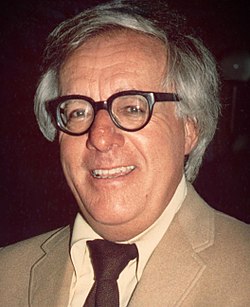Ray Bradbury Quote
How men envy and often hate these warm clocks, these wives, who know they will live forever. So what do we do? We men turn terribly mean, because we can't hold to the world or ourselves or anything. We are blind to continuity, all breaks down, falls, melts, stops, rots, or runs away. So, since we cannot shape Time, where does that leave men? Sleepless. Staring.
Ray Bradbury
How men envy and often hate these warm clocks, these wives, who know they will live forever. So what do we do? We men turn terribly mean, because we can't hold to the world or ourselves or anything. We are blind to continuity, all breaks down, falls, melts, stops, rots, or runs away. So, since we cannot shape Time, where does that leave men? Sleepless. Staring.
Related Quotes
About Ray Bradbury
Ray Douglas Bradbury (US: BRAD-berr-ee; August 22, 1920 – June 5, 2012) was an American author and screenwriter. One of the most celebrated 20th-century American writers, he worked in a variety of genres, including fantasy, science fiction, horror, mystery, and realistic fiction.
Bradbury is best known for his novel Fahrenheit 451 (1953) and his short-story collections The Martian Chronicles (1950), The Illustrated Man (1951), and The October Country (1955). Other notable works include the coming of age novel Dandelion Wine (1957), the dark fantasy Something Wicked This Way Comes (1962) and the fictionalized memoir Green Shadows, White Whale (1992). He also wrote and consulted on screenplays and television scripts, including Moby Dick and It Came from Outer Space. Many of his works were adapted into television and film productions as well as comic books. Bradbury also wrote poetry which has been published in several collections, such as They Have Not Seen the Stars (2001).
The New York Times called Bradbury "An author whose fanciful imagination, poetic prose, and mature understanding of human character have won him an international reputation" and "the writer most responsible for bringing modern science fiction into the literary mainstream".
Bradbury is best known for his novel Fahrenheit 451 (1953) and his short-story collections The Martian Chronicles (1950), The Illustrated Man (1951), and The October Country (1955). Other notable works include the coming of age novel Dandelion Wine (1957), the dark fantasy Something Wicked This Way Comes (1962) and the fictionalized memoir Green Shadows, White Whale (1992). He also wrote and consulted on screenplays and television scripts, including Moby Dick and It Came from Outer Space. Many of his works were adapted into television and film productions as well as comic books. Bradbury also wrote poetry which has been published in several collections, such as They Have Not Seen the Stars (2001).
The New York Times called Bradbury "An author whose fanciful imagination, poetic prose, and mature understanding of human character have won him an international reputation" and "the writer most responsible for bringing modern science fiction into the literary mainstream".
